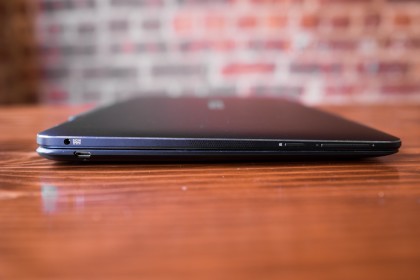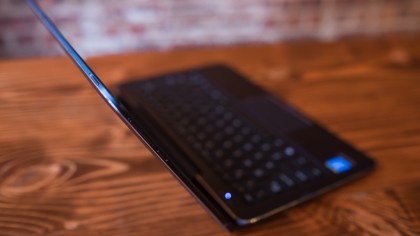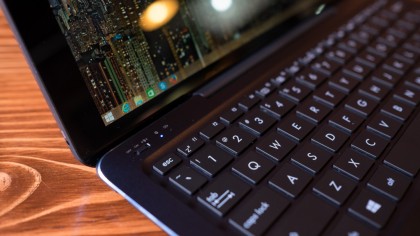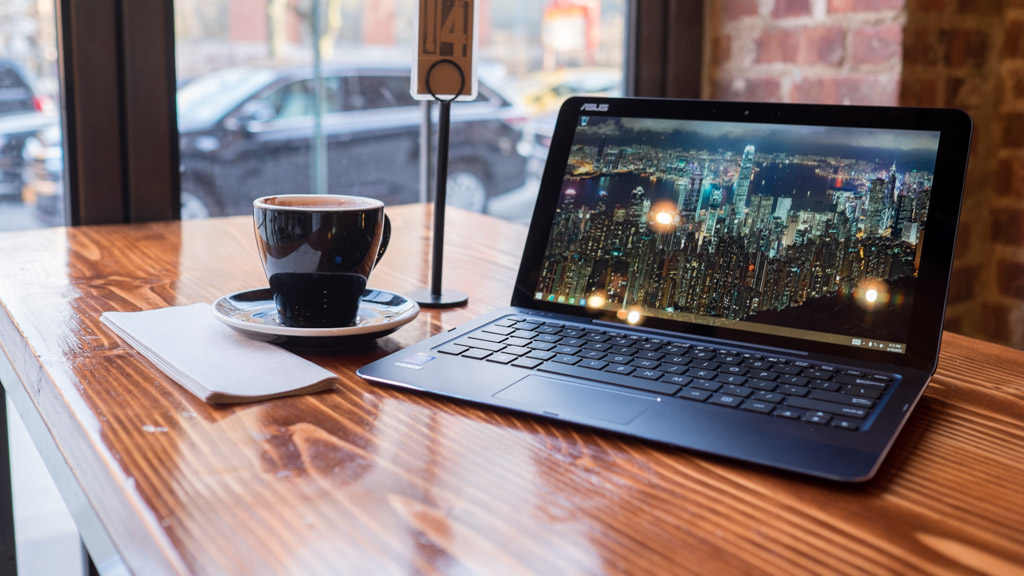Why you can trust TechRadar
Whereas both Asus's previous Transformer Book Duet and TX300 felt unwieldy as tablets, the T300 Chi is perfectly lightweight at just 1.58 pounds (720 g). It's noticeably lighter compared to the 1.76-pound (798 g) Surface Pro 3. However, attaching the Bluetooth-connected keyboard brings up the total weight of this unit to a less impressive 3.14 pounds (1,430 g), which puts it well behind the 2.62-pound (1,188 g) Surface Pro 3 with its keyboard cover.
Similarly, Asus' transforming tablet by itself is a bit thinner, measuring 0.28-inches versus Microsoft's 0.36-inch thick unit. Add in the keyboard, and T300 Chi's dimensions bump up to 12.5 x 7.5 x 0.65 inches (317 x 191 x 16 mm), making it just a bit bigger the Surface Pro 3, which measures in at 11.5 x 7.93 x 0.36 inches (292 x 201 x 9 mm).
Comparatively, the Yoga 3 Pro tips the scales at 2.62 pounds (1,188 g) and measures 13 x 9 x 0.5 inches (330 x 228 x 12 mm). This places the Lenovo as being a just slightly lighter machine than the Transformer Book, if a bit bulkier than it and Microsoft's tablet-laptop.

Here is the Transformer Book T300 Chi configuration given to TechRadar for review:
Spec Sheet
- CPU: 1.2GHz Intel Core M 5Y71 processor (dual-core, 4MB cache, up to 2.9GHz with turbo boost)
- Graphics: Intel HD Graphics 5300
- RAM: 8GB DDR3L (1600MHz)
- Screen: 12.5-inch, 2,560 x 1,440 (WQHD) capacitive multi-touch IPS display
- Storage: 128GB SSD
- Ports: micro USB 3.0, mini HDMI, microSD card reader, headphone/mic combo jack
- Connectivity: Intel Dual Band Wireless-N 7265 + Bluetooth 4.0 LE
- Camera: 2MP 720p webcam
- Weight: 3.14 pounds
- Size: 12.5 x 7.5 x 0.65 inches (W x D x H)

For $899 (about £601, AU$1,156), the Transformer Book T300 Chi comes rather well equipped with the exception of the paltry 128GB of SSD storage. Sadly there's no way of increasing the onboard storage (either with Asus or doing it yourself), but one solution is to buy a microSD card and have it slotted in at all times. If the WQHD model is too rich for your blood, Asus also plans to release a lower-end 1080p model for $699 (about £458, AU$905) equipped with a slower Intel Core M 5Y10 and 4GB of RAM instead.

Alternatively, for $999 (£769, AU$979) you could get the Surface Pro 3 outfitted with a headier 1.9GHz Intel Core i5 chip, 128GB SSD, but only 4GB of RAM. Keep in mind that the all-important Type Cover is sold separately as a $129 (£109, AU$149) accessory. If you're looking to stick to a budget under 1,000 smackers, the Surface Pro 3 is also available with a Core i3 CPU and 64GB of storage for $799 (£579, AU$1,209).
Meanwhile, the Lenovo comes at a higher $1,299 (£999, AU$2,099) premium, sporting the same Intel Core M-5Y71 processor. While you'll be paying more for the same amount of computing power, the Yoga Pro 3 comes with a few advantages, including 256GB of SSD storage, 802.11ac Wi-Fi and a higher resolution 3,200 x 1,800 display.
Kevin Lee was a former computing reporter at TechRadar. Kevin is now the SEO Updates Editor at IGN based in New York. He handles all of the best of tech buying guides while also dipping his hand in the entertainment and games evergreen content. Kevin has over eight years of experience in the tech and games publications with previous bylines at Polygon, PC World, and more. Outside of work, Kevin is major movie buff of cult and bad films. He also regularly plays flight & space sim and racing games. IRL he's a fan of archery, axe throwing, and board games.

